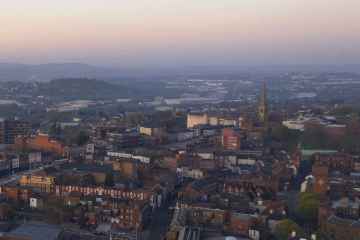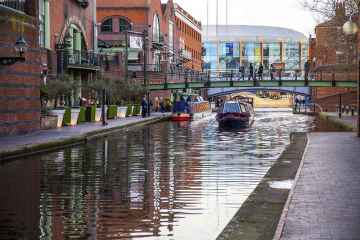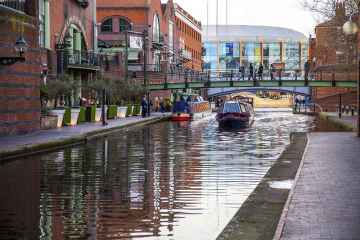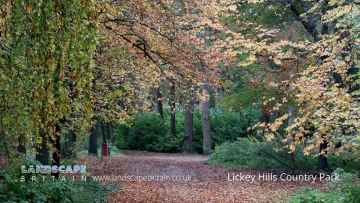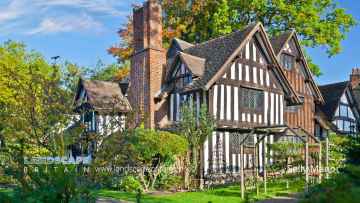Solihull is a Town in the county of West Midlands.
Solihull is a large town in the West Midlands of England, located to the southeast of Birmingham. It is known for its affluent suburbs, historic architecture, and expansive green spaces, which contribute to its reputation as one of the most desirable places to live in the UK. The town boasts a mix of urban and rural environments, offering residents the convenience of modern amenities alongside the tranquillity of countryside living. The high standard of living, combined with excellent transport links and proximity to major cities, makes Solihull an attractive destination for families, professionals, and retirees alike.
The town’s history dates back to medieval times, with several notable buildings that have stood the test of time. Among these is St. Alphege Church, a striking example of medieval architecture that dominates the town centre. Tudor-style timber-framed houses, such as those in the picturesque village of Bickenhill, add to Solihull’s historic charm. Additionally, the town is home to several stately homes and parks, including the Grade II listed Malvern and Brueton Parks, which offer a haven for wildlife and a place for locals to enjoy leisurely walks and outdoor activities.
Solihull’s economy is robust and diverse, supported by a range of industries including manufacturing, retail, and services. The town is particularly noted for its automotive industry, with the presence of the Jaguar Land Rover plant being a significant employer and contributor to the local economy. Solihull’s town centre is a vibrant hub of activity, featuring a wide array of shops, restaurants, and entertainment venues. Touchwood, a modern shopping centre, and Mell Square offer a variety of retail experiences, from high-end boutiques to well-known high street brands.
Education is a strong point in Solihull, with numerous high-performing schools and colleges. The town is also within reach of several universities, providing ample opportunities for higher education. Solihull College and University Centre offers a range of vocational courses and degrees, catering to the educational needs of the local population and beyond. The emphasis on education and the availability of quality schooling options make Solihull an appealing place for families with children.
Community spirit is evident in Solihull, with numerous events and festivals held throughout the year that bring residents together. The annual Solihull Summer Fest, a music festival featuring a variety of acts, is a highlight, drawing visitors from across the region. Farmers’ markets, arts fairs, and community sports events also play a vital role in fostering a sense of togetherness among the townsfolk. These events, coupled with the town’s welcoming atmosphere, ensure that Solihull remains a lively and inclusive community.
In summary, Solihull is a town that successfully balances the old with the new, offering a high quality of life for its residents. Its rich history, strong economy, excellent educational facilities, and vibrant community life make it a standout location in the West Midlands. Whether one is looking for a place to raise a family, retire, or simply enjoy a peaceful yet connected lifestyle, Solihull provides an ideal setting.
Solihull postcode: B91 3
There are great places to visit near Solihull including some great towns, shopping centres, castles, cities, canals, country parks, woodlands, parks, historic buildings, villages, museums, gardens, nature reserves, lakes and airports.
Dudley, Stourbridge, Halesowen, Moseley, Handsworth, Harborne, and Sutton Coldfield are some of Solihull best towns to visit near Solihull.
Shopping Centres to visit near Solihull include Merry Hill, and Bullring & Grand Central.
Solihull has some unmissable castles nearby like Dudley Castle, and Caluden Castle (ruin).
Don't miss Birmingham, Coventry, and Wolverhampton's cities if visiting the area around Solihull.
Solihull is near some unmissable canals like Birmingham to Wolverhampton Canal,
The area around Solihull features a number of interesting country parks including Lickey Hills Country Park, Woodgate Valley Country Park, Sutton Park, Kingsbury Water Park, Sandwell Valley Country Park, Coombe Country Park, and Coombe Abbey Country Park.
Solihull has some unmissable woodlands nearby like Lickey Hills Country Park, and Walsall Arboretum.
The area around Solihull boasts some of the best parks including Cannon Hill Park, Grove Park, Caludon Castle Park, Baddesley Clinton, Elmdon Park, and Walsall Arboretum.
Don't miss Victoria Square - Birmingham, Birmingham Museum and Art Gallery, Selly Manor Museum, Baddesley Clinton, St Alphege Parish Church, and Packwood House's historic buildings if visiting the area around Solihull.
The area around Solihull boasts some of the best villages including Bournville, and Lea Marston.
The area around Solihull features a number of interesting museums including Selly Manor Museum, and Cadbury World.
The area around Solihull's best gardens can be found at The Birmingham Botanical Gardens.
Moseley Bog, RSPB Sandwell Valley, and Brandon Marsh Nature Reserve are great places to visit near Solihull if you like nature reserves.
Solihull has some unmissable lakes nearby like Pendigo Lake, Cocks Close Pond, Kingsbury Water Park, and Earlswood Lakes.
Birmingham Airport is a great place to visit close to Solihull if you like airports.
Solihull History
There are some historic monuments around Solihull:
Areas of Solihull
Like most towns and cities Solihull is comprised of a number of areas, once separate villages or small towns and parishes now part of Solihull.
Many of the areas of Solihull have their own character and places of interest.
Places to see near Solihull
History of Solihull
The town is noted for its historic architecture, which includes surviving examples of timber framed Tudor style houses and shops. The historic Solihull School dates from 1560 (although not on its present site). The red sandstone parish church of St. Alphege dates from a similar period and is a large and handsome example of English Gothic church architecture, with a traditional spire 168 feet (51 metres) high, making it visible from a great distance. It is located at the head of High Street and is a Grade I listed building. It was founded in about 1220 by Hugh de Oddingsell. A chantry chapel was also founded there by Sir William de Oddingsell in 1277 and the upper chapel in St Alphege was built for a chantry.















